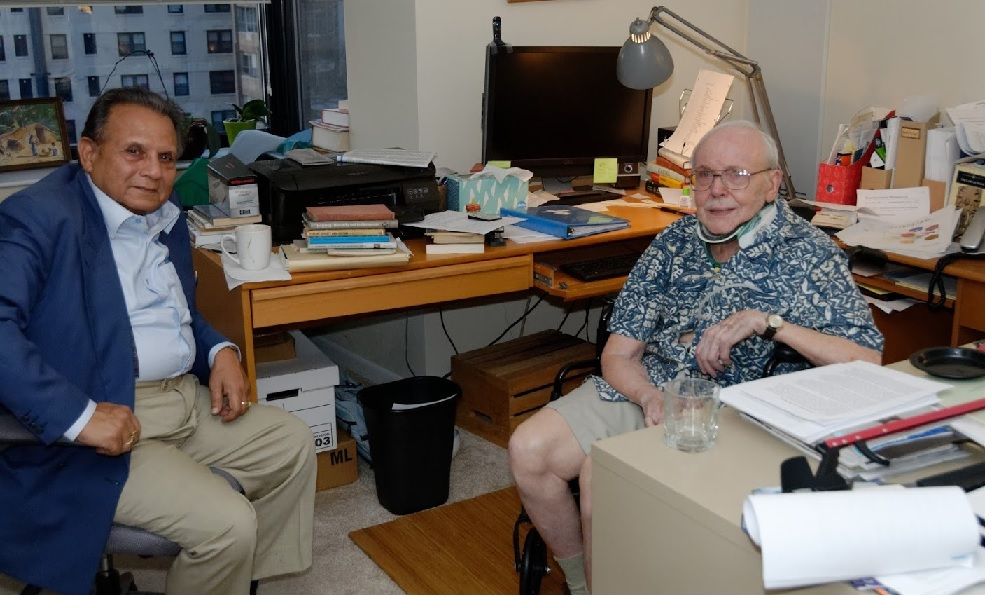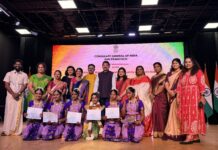

CHICAGO: Visiting theater expert from Delhi, India, Prof. Bharat Gupt, delivered a talk on “Unity of Three Shastras: Artha, Kama and Natya” to the Indic Academy on May 6 here at the Scott R. Triphahn Community Center.
He attempted to demonstrate the underlying coherence of the Hindu traditional treatises (shastra) that governed the legitimate pursuit of pleasure (kama) and wealth (artha) with the ancient treatise on theater (natya-shastra) on performance and the arts. Indic Academy is a global, multi city, horizontal network of academics, authors, artists and activists involved in protecting, preserving, and promoting Indic thought and values to facilitate an Indian renaissance.
Executive Member of Indira Gandhi National Center for Arts (IGNCA), Gupt was the prime mover behind the series of over four conferences held across India in 2016-17 to celebrate the millennium of the great philosopher-mystic Abhinavagupta (10-11th C), who authored the most comprehensive, encyclopedic and authoritative commentary on the Natya-Shastra, which still governs the aesthetics of the classical arts of contemporary India, such as the various regional dance styles.
As the leading Indian authority on ancient Greek theater, he hosted two IGNCA conferences in February in Delhi and Benares on “Indo-Greek scholarship 1795-2018,” which was attended by eminent scholars from Greece. Bharat is a theater theorist, sitar and surbahar player, musicologist, cultural analyst, and newspaper columnist.
Gupt, who has designed a temple based on principles of traditional architecture in Delhi, visited BAPS Swaminarayan and Jain temples, and Hindu Temple of Greater Chicago, Lemont, upon arrival. He made a courtesy visit the same evening to pay his respects to legendary American anthropologist, 94-year old Prof. McKim Marriot, who is increasingly celebrated for his insistence on understanding Hinduism and Indian society on its own terms.
At the University of Chicago Co-op bookshop, he had picked up “Against Dharma: Dissent in the Ancient Indian Sciences of Sex and Politics” (March 2018), the most recent title by UC Prof. Wendy Doniger, who is now notorious in India and across the diaspora for her tenacious Hindu-bashing. Her book seeks to portray the (nominally Brahmin) authors of the kama and arthashastras as underhandedly subverting the treatises on religion (dharma). Gupt cited a core passage during his lecture and attempted to rebut her case for disunity and conflict between the shastras.
Gupt spent a rewarding four days re-discovering India and inter-cultural dialogue in Chicago: visiting the galleries, especially on Indian and Greek art, at the Art institute; taking selfies before the “Bean” (Cloud Gate) designed by Indian-born British artist Sir Anish Kapoor at Millennium Park; dining in Devon Avenue’s Little India and admiring the Baha’i temple.
Before catching his return flight on May 7, he attended the afternoon recitation of contemporary Hindi poetry followed by a panel discussion on the “Importance of preserving Indian languages among the youth” hosted at the Consulate General of India.
An album of Gupt’s Chicago visit that includes the complete recording of his May 6 lecture is accessible at https://photos.app.goo.gl/fCgutKBzhwqvAQAdA. He was interviewed the same evening on the contemporary crisis in arts and culture in India by TV Asia’s Vandana Jhingan
Sunthar Visuvalingam






